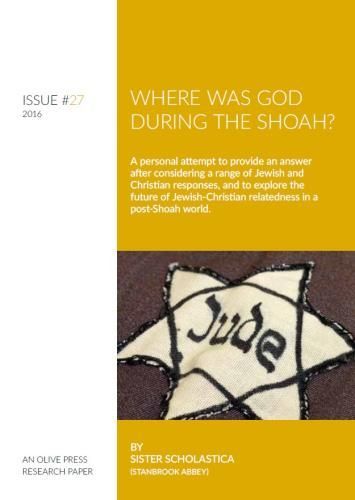The question “Where is God…” has been asked of many man-made and natural catastrophes of the twentieth century and long before – all the way back to the Tower of Siloam in Jesus’ time, and indeed back to Job. “Where was God…?” In the post-modern era1 the Shoah, however, seems to pose the question with a special agony and urgency to all people of faith. It was God’s own people, His chosen people, who were singled out2 for total annihilation in a barbarically brutal and yet systematic and bureaucratic way.3 If God could appear to abandon His own people and be completely silent in the face of their suffering, how can we continue to worship and have faith in Him? The questions are still reasonable and pressing seventy years after the event: assuming that God had once existed, does He still exist? Has He died, as Nietzsche and others suggested the previous century? Has He simply given up on the human race and retreated to some far off celestial court? Is humanity freed from any responsibility to God? Has the Covenant been irreparably broken?
All these are questions which people have agonised over in the decades since the Shoah. From the outset it must be clearly stated that to try and find a purpose or meaning for the Holocaust is impossible – and blasphemy. But to seek and find a response is essential. No “answers” can be fully acceptable to all. And yet it is imperative that we keep the questions alive and remember and, by remembering, seek to counter the intolerance and hatreds that continue to surface today. The American Orthodox Rabbi, Irving Greenberg wrote in his ground breaking essay Cloud of Smoke, Pillar of Fire: Judaism, Christianity and Modernity after the Holocaust that the Holocaust challenges us all: Jews, Christians and everyone one 2 WHERE WAS GOD DURING THE SHOAH?who inhabits the modern, secular world. “Not to respond is to collaborate in its [the Shoah’s] repetition.”4
Abraham Joshua Heschel wrote “Few are guilty, all are responsible.”5 As a Christian I must face the truth that, while not consciously guilty of any overt act of antiSemitism myself, I belong to the Church which, through the frailty and ignorance of its human agents, has throughout its history created a climate in which such acts could be actively supported or at least tolerated. We must all accept responsibility for our past.
What follows is a purely personal attempt to come to some kind of understanding myself, gathered from my own prayer and reading. I can only attempt to respond as a Christian and as an inhabitant of the modern, secular world, but it has helped my understanding to read a variety of Jewish responses.
In this paper I begin by outlining a range of Jewish perspectives on the question, starting with the voices of two of the Shoah’s most famous survivors. I then examine the challenge that the horror presents to Christianity, and look at some Christian responses. Finally, I attempt to draw some conclusions and consider a possible post-Shoah future in which Jews and Christians must come closer together in joint understanding, to ensure there can be no repetition.
This is my attempt to reconcile the God I know as Love and Peace with the despair and desolation of the Shoah.

